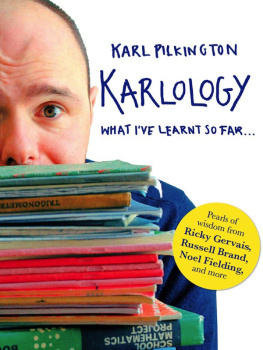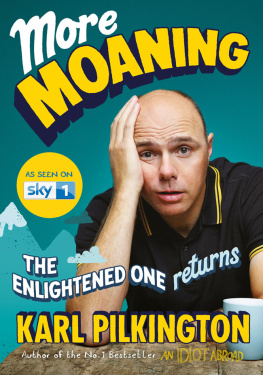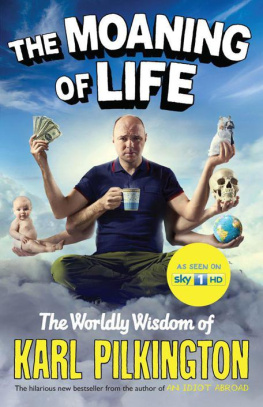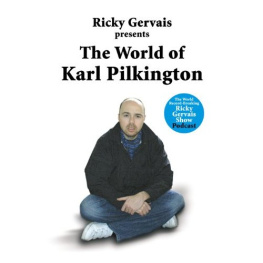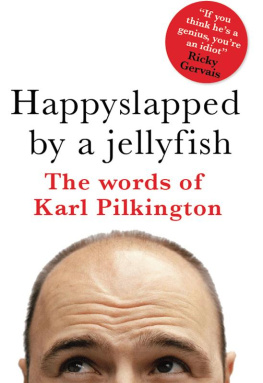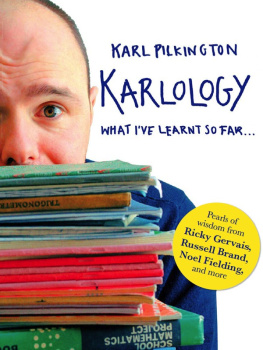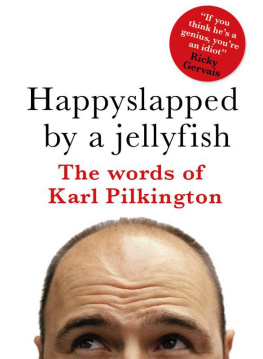Karlology
What Ive learnt so far
K ARL P ILKINGTON

Dorling Kindersley
Copyright

LONDON, NEW YORK, MELBOURNE, MUNICH, AND DELHI
First published in Great Britain in 2008 by Dorling Kindersley Limited, 80 Strand, London WC2R 0RL
Copyright 2008 Karl Pilkington
The moral right of the author has been asserted
2 4 6 8 10 9 7 5 3 KD127 08/08
All rights reserved. No part of this publication may be reproduced, stored in a retrieval system, or transmitted in any form or by any means, electronic, mechanical, photocopying, recording, or otherwise, without the prior written permission of the copyright owner.
A CIP catalogue record for this book is available from the British Library
ISBN 978-1-40533-335-1
Jacket photography by Ben Morris Model photography by Guy Archard with additional photography by Sarah Ashun The publisher would also like to thank the following for kind permission to use their images (a-above; b-below/bottom; c-centre; f-far; l-left; r-right; t-top) Corbis: 9495; Francis G. Mayer 70bl; The Gallery Collection 186187; Getty Images: GK Hart / Vikki Hart 140141; Arthur Sasse / AFP 19clb (Einstein), 169bl (Einstein); Thomas Marent: 7879; PA Photos: Ben Margot / AP 157cla; Reuters: Claro Cortes 157fcla
All other images Dorling Kindersley For further information see: www.dkimages.com
This Digital Edition published 2010. ISBN: 9781405365444 Digital conversion prepared by DK Digital, London and DK Digital Media, Delhi.
Discover more at
www.dk.com


Foreword
They say the more you know, the more you know you dont know. I dont know who first said this (which proves the saying is right), and I dont know who came up with this one either: All we know is still infinitely less than all that still remains unknown. Its comments like these that put me off trying to learn.
I dont know if Im cut out to be really intelligent. Were all born with a brain, but are we all born with the same quality of brain?
Then again, its easy to blame the brain but sometimes its my eyes that are lazy. When I try to read facts or in formation, my eyes drift away onto something else, so the chance of having my eyes working and my brain interested at the same time is small. Then theres my ears: they might hear something that tells the brain to stop reading and tells the eyes to go and have a look at what the ears heard. I dont know which one of these senses makes the main decisions in my life.
Maybe this is why I dont know much.
Karl will never be a high-flier

THERES A FAMOUS QUOTE that goes something like Show me the boy at seven and Ill show you the man. Mrs Mathews, my infant school head teacher, thought she could do that, but she couldnt. Though she might have been right if shed said it about John Totton, the school midget, as Im guessing he didnt change his looks that much. Karl will never be a high-flier was what she said to me mam and dad at my first parents evening. Some kids would take that comment as a challenge and go on to try to prove her wrong, but my brain decided to deal with it by going on strike.
I dont think anyone in that school was gonna be a high-flier. The kids hated being there and so did the teachers. I put it down to the state of the school. I dont think Im exaggerating when I say the Colosseum in Rome is in better condition than some of them classrooms were. The fact the school was knocked down in 1979 and the Colosseum is still standing is evidence of this.
The school was a right mess. It must have been built on the cheap in the late 50s or early 60s. It was made from more wood than brick and was placed in the middle of a big field, with the council estate where I grew up on one side, and a big chemical plant and swamp surrounded by electricity pylons (that gave off a constant loud buzz) on the other. I dont know what sort of chemicals they were knocking out at the plant, but in every assembly we were told by Mrs Mathews to stay away from the fields boundaries. We never knew why this was so important until one morning when she brought out a pupil whod got too close to the boundary and had burnt his face on the grass. To this day I dont know what it was that caused his burns, but for years I thought thats why there were keep off the grass signs in parks.
There was also a major problem with flies coming from the swamp. It got so bad one hot summer that our home work was to come up with ways to keep flies out of the classroom. I asked me dad for help. His advice was put a bucket of shit in the corridor. He then told me how a mate of his put an advert in the local newspaper years ago that read, Guaranteed to get rid of unwanted flies. Works 100%. Send payment to receive your fly killing kit NOW. People sent the payment and all he sent back to them was a small block of wood and some instructions that read, Place fly on block of wood and hit with hammer. (Hammer not included.) Me dad said the bloke got away with it as it did work if you could get hold of the fly.
I came up with Sellotape sprinkled with sugar. I dont like killing things, so this seemed like a nicer way for them to go as at least theyd have a nice meal before they died a bit like prisoners on death row. Most kids just took in cans of fly spray. I think the class of 79 single-handedly did in the ozone layer with all them CFC gases. Like I say, I dont think any pupils who went to that school learnt much from being there, but maybe now, due to the chemical plant, poisonous grass and intake of fly spray, a few of them now have superpowers.
For the few years I was there, I cant recall seeing a care taker. That job was done by kids held back after school for being naughty. Instead of doing lines or reading a book, theyd re-putty windows or rub down and paint door frames. I was held back twice and told to weed the play ground. There were some jobs that kids werent qualified to do like repairing holes in the roof and walls so they were just left to get worse, which meant that some of the schools rooms could only be used in certain weather. I was at that school for two or three years before they knocked it down, and apart from one hot summer I dont think I ever took my coat off.
As music was probably seen as the least important subject, music lessons were done in one of the worst rooms (thats if they werent already cancelled due to the teacher being off with flu). It was so freezing in that room, the maracas shook on their own. Religious education was another subject that didnt seem to be taken seriously, as the lessons were mainly done in the cloakroom. (The space may as well have been used for something seeing as nobody ever took their coat off.) It was hard for us to understand why there was so much fuss about Jesus being born in a stable when here we were sat somewhere equally as grim. To make the space a bit more bearable, the cloakroom was also where the school pets were kept. Most schools had a hamster or a gerbil, but Mrs Mathews decided terrapins might be more at home in our school due to the cooler, damper conditions. But I think it was too damp as they seemed to go all mouldy, and the school had to get rid of them in the end as some kids got really sick from handling them.
Next page
